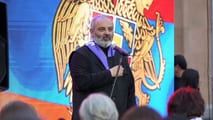Human rights reduced to individual will?
Only the return to a vision close to that of the drafters of the Universal Declaration of Human Rights of 1948, now celebrating its 70th anniversary, is likely to enable the human rights system to last.
This article was published on Aleteia on 19 November 2018.
Some articles criticizing Human rights are too simplistic: they refuse to distinguish between France’s Declaration of Rights of 1789 and the one of the United Nations (UN) in 1948. Yet, these two texts differ from one another in terms of their respective philosophies. The Declaration of 1789 kept human rights within the limits of the “Nation”, which was supposed to free citizens from Divine authority and society. Conversely, the Universal Declaration of 1948 stems from the post-war intent to establish an international order which the states would have to follow. This text, based on the primacy of the human person, set up human rights as a sort of morality flowing out of Natural Law.
The willful omission of the divine
However, in an essay that has just been published, Les Droits de l'homme dénaturé (Le Cerf), jurist Grégor Puppinck demonstrates that the basis of this new world order is flawed. As head of the European Center for Law and Justice (ECLJ), the author highlights the limits of the Universal Declaration and the methods for protecting human rights that have been introduced since. In particular, these texts deliberately omit any reference to God as the creator of Man and the source of human dignity, unlike a significant number of national constitutions. The post-war debate which occurred over this matter shows that this omission of divine references was a demand by the bloc of communist and atheist States.
This failure to acknowledge the divine origin of human rights has had a significant influence on their subsequent interpretation. It has especially encouraged the disembodiment of human dignity, which over time has gradually been reduced to mere individual will and autonomy. For instance, this transformation brought some defenders of human rights to include ART or sex reassignment within the right to privacy.
Natural and anti-natural rights
Scholars usually identify several generations of human rights, which can sometimes conflict with each other in various areas: civilian and political, economic and social, environmental… Nowadays this categorization no longer seems relevant, as the purpose of human rights expansion is no longer to move people out of poverty and ignorance through means such as work or education, for instance. Economic and social rights have been replaced by societal rights, which aim to free a hypothetical individual from the constraints of human nature. Grégor Puppinck suggests another classification of rights, with natural rights, proclaimed during the post-war period, on the one hand, and on the other hand anti-natural rights (euthanasia, abortion…) and transnatural rights (eugenics, sex reassignment…) which are emerging today. These new human rights, which deny or reshape human nature, violate the true rights through which a person’s humanity is revealed.
Given these changes, highlighted by many ongoing debates, it is essential to reaffirm the natural rights of Man. Only the return to a vision close to that of the drafters of the Universal Declaration is likely to enable the human rights system to last. Those texts, adopted by the post-war Christian society, can serve as valuable resources in contesting the current abuses of human rights. It is indeed always worth reminding international institutions of their duties, especially that of construing and implementing treaties “in good faith”. Grégor Puppinck does not fail to warn them of this, as “unlike the Church [they did not] receive the promise of eternal life and [could] disappear” (free translation).
Human rights reduced to individual will?
Nonetheless, can one really build a fair and effective criticism of post-modern society on the basis of post-war human rights? These rights, although natural, constitute an insufficient moral framework. The inner logic of human rights is an issue: they emphasize what society owes to individuals but do not mention that individuals also owe certain things to society. Human rights contain the seeds of a strong assertiveness aiming to free Man from God and His law. This is why the magisterium of the Catholic Church fought and criticized human rights for a long time as “so hostile to religion and society”[1] . The Church would prefer to guide man in fulfilling his duties, rather than encourage him to focus on his rights.
Why then is it legitimate to fight for true human rights before international institutions? There are two reasons that can justify this choice. On the one hand, promoting man's natural rights is a way to lead back to man's duties. As Pope Leo XIII stated, “man's rights spring from his duty toward God”. Indeed, the right to life results from the prohibition of murder; the freedom of association allows the fulfilment of several social duties; and the freedom of religion stems from our duty to worship God. These duties are not only the source of human rights, but also their purpose, in line with human nature.
An ideological battlefield
On the other hand, and most importantly, human rights can be used with pragmatism as an argumentum ad hominem. That is, it is legitimate to confront international institutions with the very texts and principles they acknowledge to be supreme. This is the strategy which has helped Grégor Puppinck win cases concerning bioethics and freedom of religion at the UN and the European Court of Human Rights (ECHR). The 70th anniversary of the Universal Declaration presents an ideal opportunity to uncover the mysteries of this long-term philosophical battle.
[1] Pope Pius VI (free translation)













